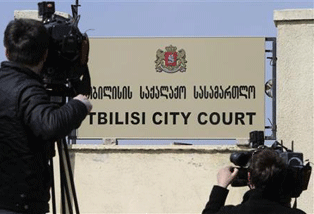TBILISI (TrustLaw) – The controversial imprisonment earlier this month in Georgia of two Israeli businessmen for trying to bribe a minister has thrown a spotlight over the former Soviet state’s legal system.
Although transparency in Georgia’s legal system has undoubtedly improved since Mikheil Saakashvili came to power in 2003, data shows that the chance of a defendant being acquitted is extremely low.
“Looking at the statistics for criminal cases in 2010, recently published by the Supreme Court, the number of cases won by the defendants was just 0.04 percent,” Mariam Gabedava, senior analyst at the Tbilisi office of the lobby group Transparency International, said.
“In 2009 it was 0.1 percent and we said at the time that the number was catastrophic but a year later and it has gotten even worse.”
The Supreme Court 2010 statistics showed that eight out of 20,196 people tried last year in the criminal courts were acquitted.
But in 98.7 percent of the cases the defendants were found guilty and sentenced.
Nana Vasadze, a spokeswoman for the Supreme Court, defended the fairness of Georgia’s criminal courts. She said that Georgia was ahead of other post-Soviet countries and that in any case these statistics don’t show the full story.
“Most of the cases that would in fact have been acquitted in the courts were dropped earlier at the Prosecutor’s office,” she said.
“In 2010, 1,394 people had cases against them dropped at the Prosecutor’s office.”
SIGNIFICANT IMPROVEMENTS
Georgia has stemmed the corruption that once swamped its business environment and it now sits at 68th position in Transparency International’s rankings, up from 124th in 2003.
Underpinning this greater transparency has been an improvement in the fairness of the legal system, which lawyers and activists say has happened since the bloodless Rose Revolution swept Saakashvili, a New York-educated lawyer, to power.
“Since the Rose Revolution in 2003, reform of the judiciary has been one of the main priorities of the Georgian government and significant improvements have been made, especially in the spheres of anti-corruption and separation of powers,” said Johanna Popjanevski, deputy director at the Central Asia-Caucasus Institute, a think tank based in Washington and Stockholm.
But it is not perfect.
“Problems remain,” Popjanevski said. “Largely, these are linked to old traditions of ruling in favour of the prosecutor and the elite. Such patterns are present throughout the region, and take time to break.”
On April 1, a Georgian judge sentenced Ron Fuchs to seven years in prison and Zeev Frankiel to six and a half years in prison. The two Israelis were found guilty of offering deputy finance Minister Avtandil Kharaidze a $7 million bribe in October 2010 in return for dropping plans to contest a ruling by an international arbitration court. The international court had ordered Georgia to pay the two Israelis $90 million.
The defence said the Israelis had been framed by the Georgian authorities, who wanted to avoid paying them the $90 million. They also pointed out the high prosecution victory rate and said it was not possible to get a fair trial in Georgia. Georgian officials have denied both allegations.
On the streets of Tbilisi, Georgia’s hilly, medieval capital, people had mixed opinions on the effectiveness of the Georgian justice system.
POLITICS AND THE LAW
Avtandil Zakashvili, a 53-year-old lawyer, had little doubt that the Georgian justice system was fair.
“I think it’s independent,” he said. “There might be some incidences when they make mistakes but overall it functions well, especially compared to previous years.”
Nino Chimakazde, a 27-year art critic, was more skeptical.
“I don’t know the exact details about the Israeli businessmen but the fact is that if the case is related to politics it might mean that the court is not impartial,” she said.
The data from the Supreme Court, gives more detail on the Georgian justice system. Plea bargaining, where the defendant pleads guilty and pays a fine in return for a lighter sentence, has become a major part of the Georgian justice system.
Defendants entered pleas in nearly 80 percent of the cases in 2010, according to the Supreme Court data.
Gabedava from Transparency International said that the Prosecutor General’s office told them that in 2009 plea bargains earned the state about 63 million lari ($38 million).
She said that often the quality of the defense lawyers is low while the state prosecutors spend millions on training.
“Often because of a lack of professionalism, defenders prefer to simply sign the plea bargain which is far easier than studying the case and preparing an argument,” Gabedava said.
Vasadze, the Supreme Court press chief, had a different point of view.
“When the state represents one side in a court case and an individual is on the other side, the winner will be the one who arrives at the court better prepared and better presents the position,” she said.
Saakashvili has been pushing Georgia to join NATO and the European Union (EU) but Kakha Kozhoridze, the director of legal aid at the Georgian Young Lawyers Association (GYLA), said the plea bargain system and the tiny acquittal rate for defendants is a potential hindrance to these aspirations.
GYLA is an independent lobby group that provides support for lawyers.
Kozhoridze said that if an individual is fighting a case that involves a state company or a well-known and well-connected person, it is virtually impossible to win.
"There should be significant state interest in why people lose at court," he said.
"Everybody from NATO, the EU and other international organisations suggest that if Georgia wants to achieve its goals then it must have an independent, impartial court."
News
December 13, 2023
Ethnic minorities outside the peace dialogue
November 6, 2023
‘Peace’ agenda of political parties
Popular
Articles
February 13, 2024




